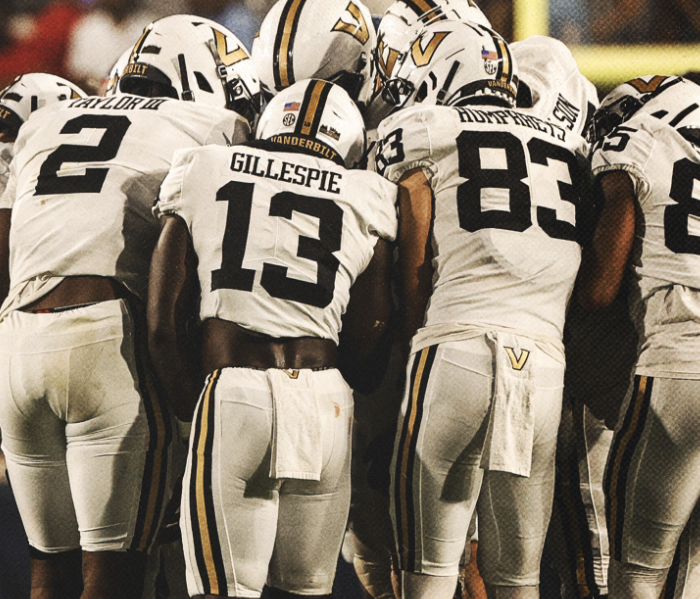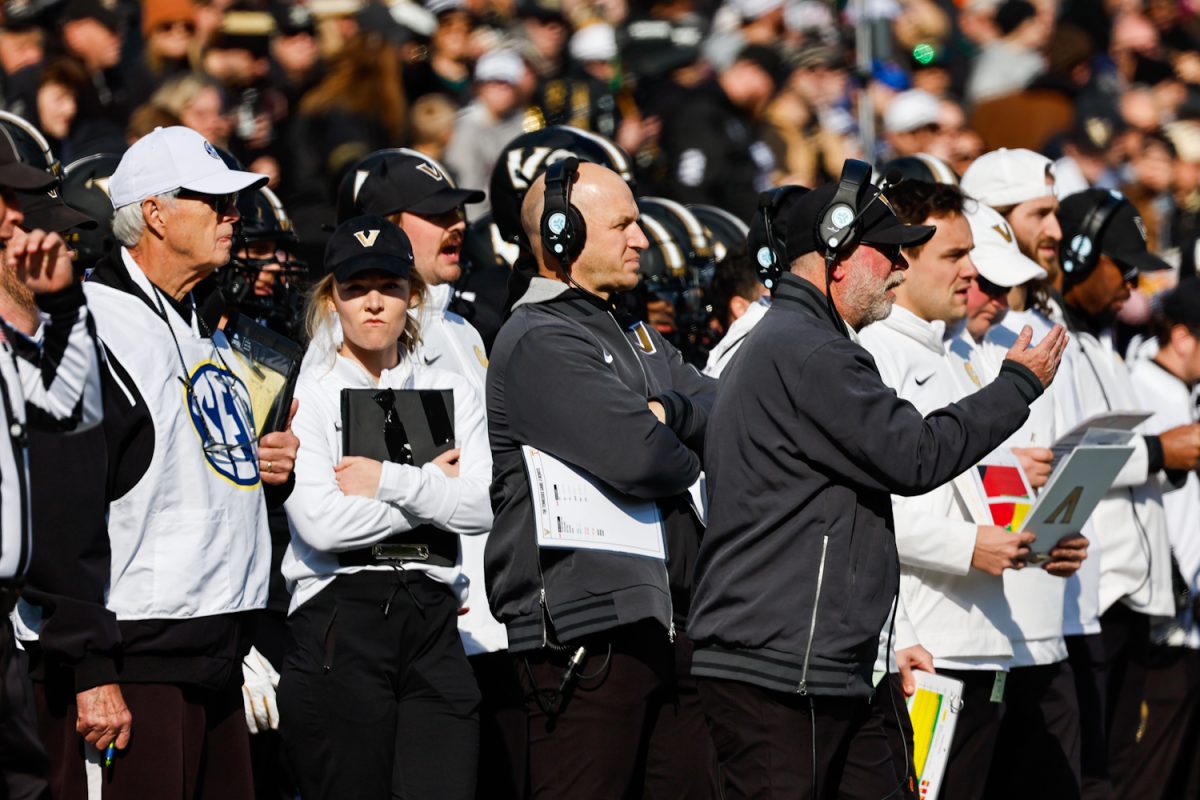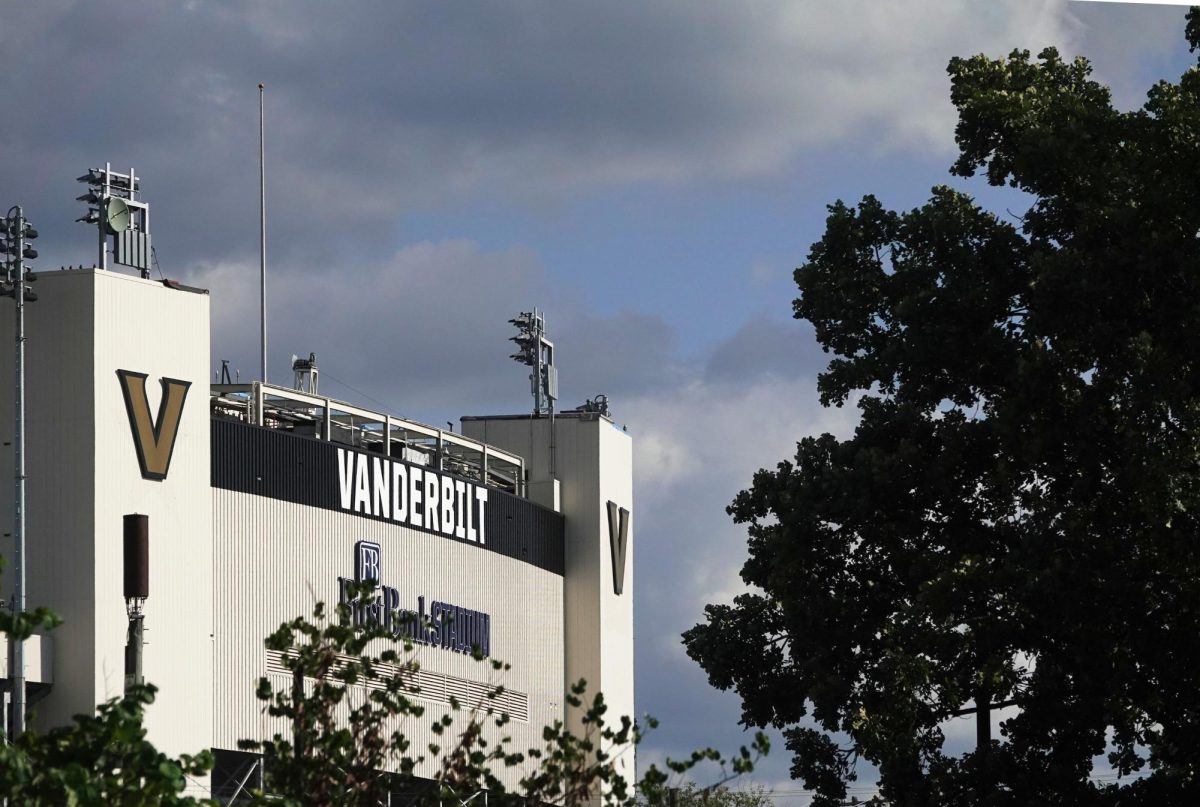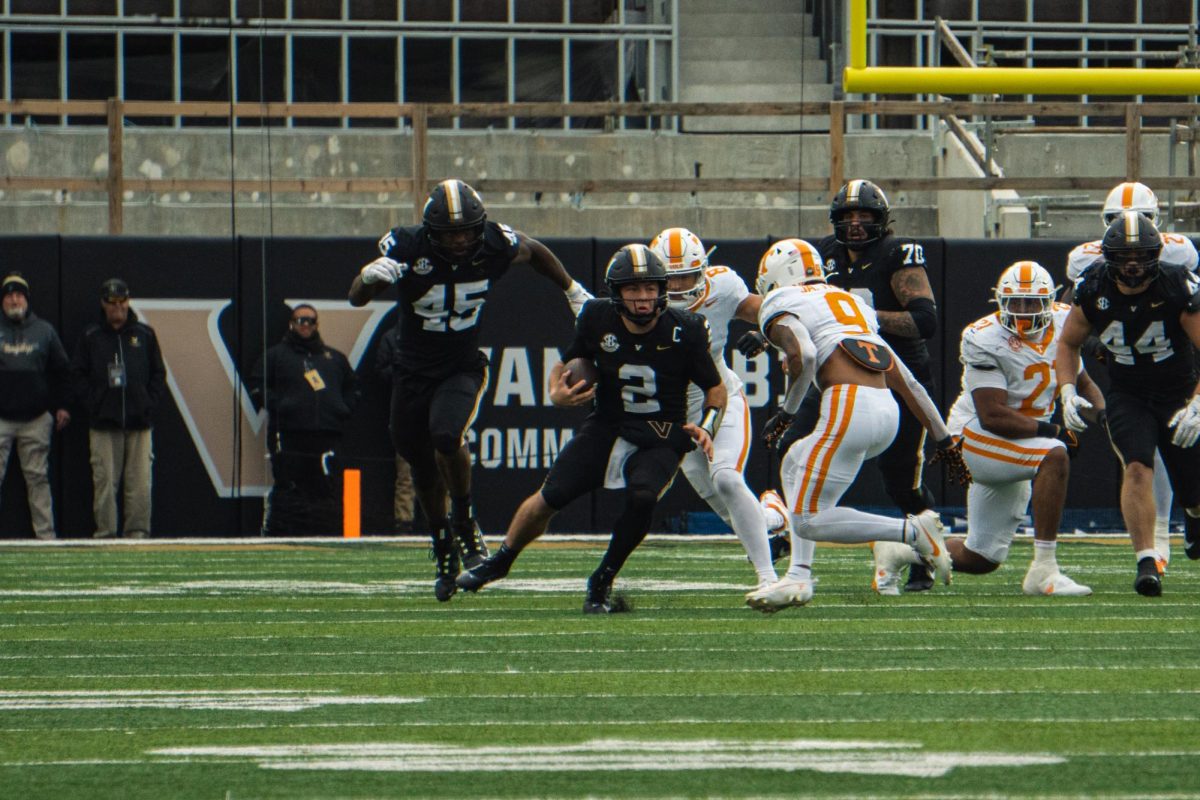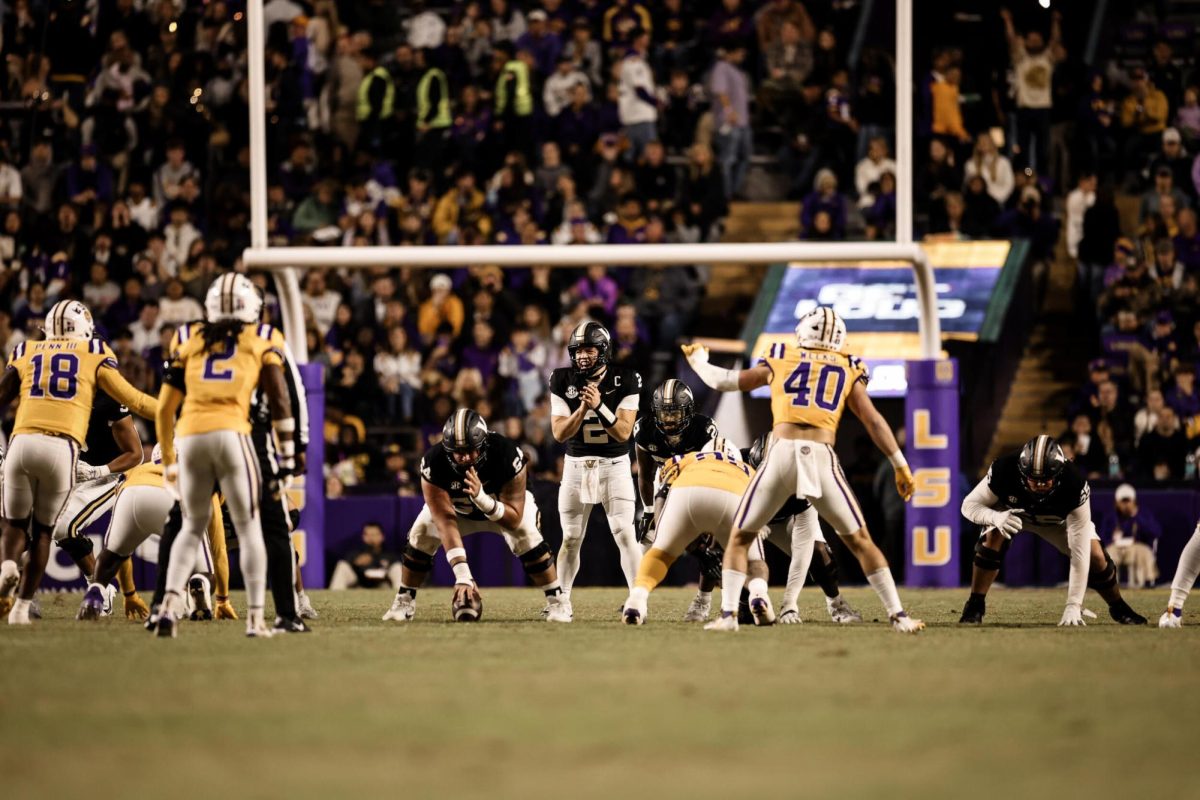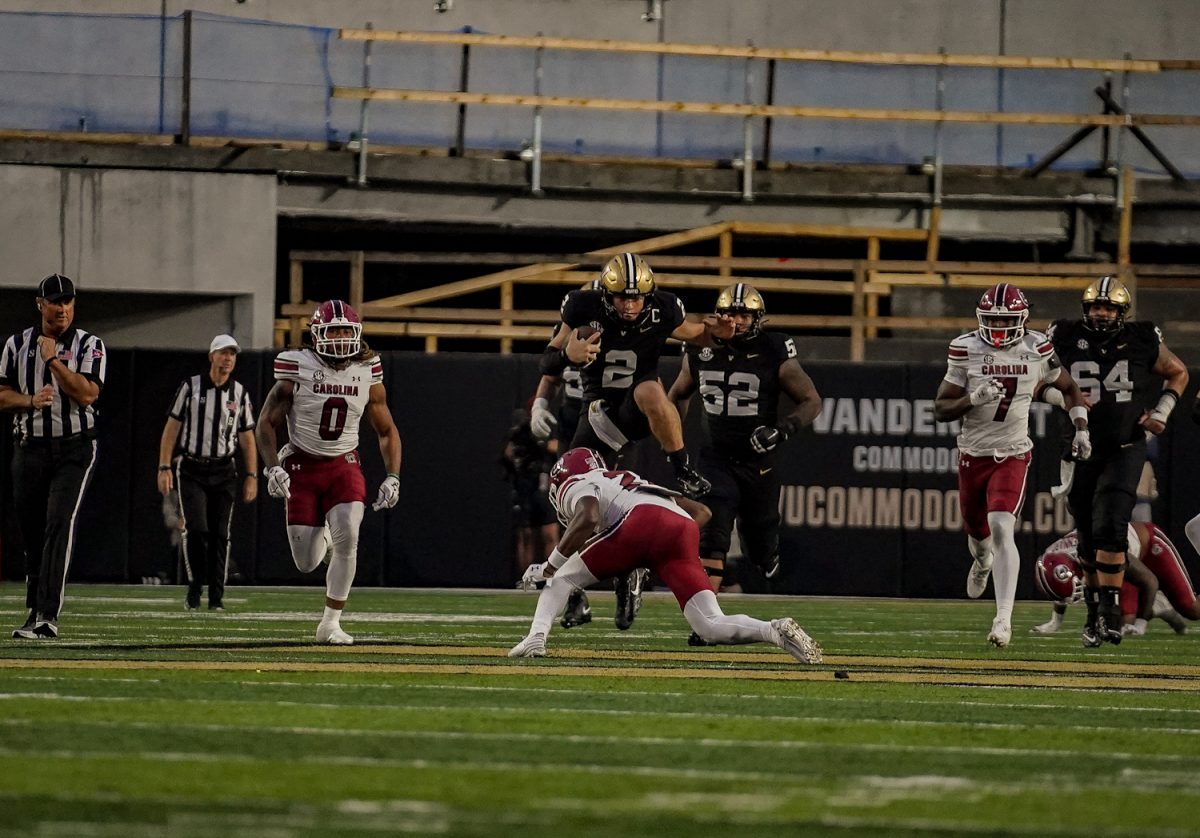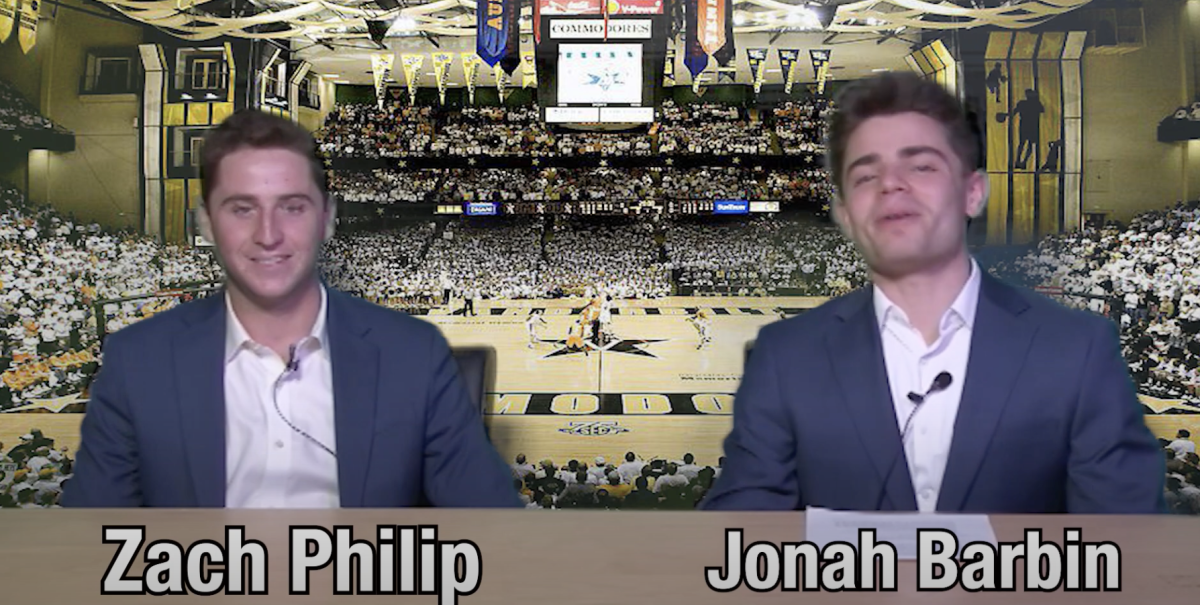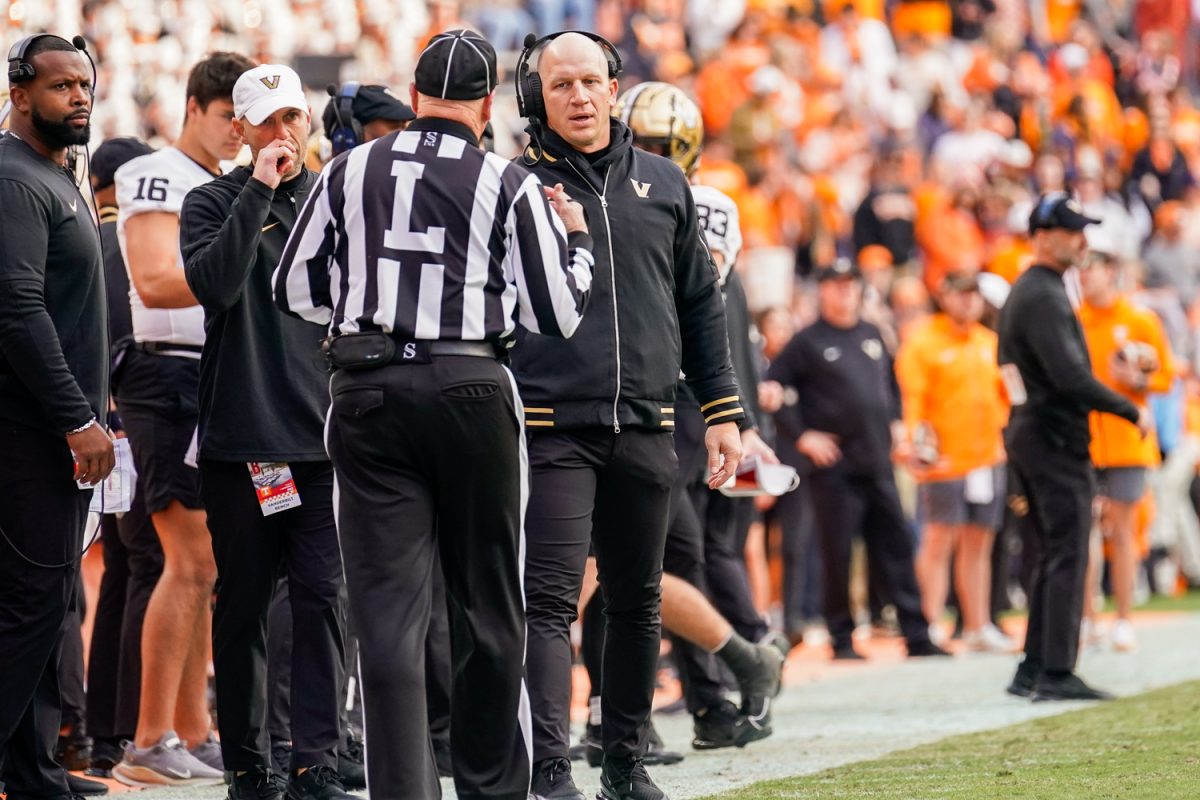As Vanderbilt’s campus basked in the festivities of Halloweekend, head coach Clark Lea and Co. took a trip to a very real haunted house: Vaught Hemingway Stadium.
Coming off of a bye week, it was hard to expect a lot from the Commodores as they headed to Oxford to take on No. 12 Ole Miss. Quarterback AJ Swann remains on the mend from an elbow contusion that has kept him out since the team’s 45-28 loss to the Kentucky Wildcats. There is speculation among students — myself included — that the sophomore signal-caller might have been fully healthy for the game, but the team relied on senior quarterback Ken Seals anyway.
Swann, who was heralded by many as the future of this program, watched from the sideline in what one could only assume was disbelief as Vanderbilt posted its worst passing performance of the Lea era. Seals came into the game as the starter but completed just 4-of-8 passes for 22 yards and an interception. He could get nothing going against the Rebels and their stout defensive front, which found its way into the Vanderbilt backfield with ease all night. Edge rusher Jared Ivey was a force to be reckoned with, as his 2.5 sacks and 2.5 tackles for loss (both team-highs) led Ole Miss to 5 quarterback takedowns, tied for a season-high.
On his first dropback of the game, the pocket collapsed around Seals, and he was forced down for a sack. On his second dropback, Seals got the pass off but made perhaps his worst read on the season, as his throw to wide receiver Richie Hoskins would get batted in the air before Trey Washington swooped in for an interception. After a few more drives of the offense completely sputtering — the Commodores went punt, punt, downs on their next three series — Lea had seen enough. He pulled Seals.
It was time for the debut of former 4-star sophomore quarterback, Walter Taylor. The Jackson, Ala., native was naturally going to struggle making his first debut against a top-15 team without any in-game experience. Expectedly, the results were not ideal, as Taylor went 4-of-12 for 38 yards and an interception, but he added 59 yards and a touchdown (Vanderbilt’s only score of the game) on the ground.
“We went to Walter to provide a spark,” Lea said after the game. “I thought he was able to do that.”
While it is perhaps something to be excited about, fans don’t want a spark. They don’t want a consolation prize. They don’t want a moral victory. They want results.
After watching this game, I have little doubt in my mind that if Swann was healthy, he would’ve taken the field. A final statline of 60 passing yards and 2 interceptions is completely unacceptable, especially against an Ole Miss team that, even with last night’s performance, ranks 11th in the SEC with 241.6 passing yards per game. It wasn’t just the passing offense that failed to perform to a quality standard, but just about every other part of the Commodores’ team as well.
Let’s talk about it.
100 Grand missed tackles
It felt like almost every time an Ole Miss player would get into space, they’d force at least one missed tackle and get an extra few yards at the end of every play.
While the actual number is but an insignificant fraction of 100 Grand, 28 missed tackles from the Commodores’ defense is concerning. It was never going to be easy for defensive coordinator Nick Howell to scheme up a game plan to stop the Rebels’ potent offense. Running back Quinshon Judkins is a bona fide superstar in college football, with Saturday night marking the third time in four games that he’s gone over 120 rushing yards. His nine touchdowns on the year are tied for first in the SEC. Sure, he’s an evasive and strong runner who’s bound to force a few whiffs here and there, but 28 missed tackles is, simply put, unacceptable.
It wasn’t just Judkins who was forcing these misses, though. Backup running back Ulysses Bentley IV and wide receivers Tre Harris and Dayton Wade got in on the action as well, crushing the Commodores after the catch.
Pretty much all head coaches come from some sort of specialist background. Whether they work with a specific position group or as coordinators, all play-callers will have a “preferred” side of the ball. Lea was the defensive coordinator at Notre Dame for three years before he came to Vanderbilt, so it stands to reason that his specialty would come on defense. Makes perfect sense, right?
You would have absolutely no idea that defense is his specialty having watched the Commodores for the better part of three years now. They have allowed the most yards per game to opposing offenses in all three seasons since Lea took the reins of the program. In 33 games played during the Lea era, Vanderbilt has allowed 453 yards per game. It’s fair to say that Vanderbilt is still in the midst of a rebuild, and perhaps it still doesn’t have the personnel to slow down these loaded SEC offenses, but to see zero improvement across the span of 26 months is inadmissible.
Lea has often harped on the importance of the little aspects of the game — like limiting penalties and mistakes, having clean special teams and not leaving points on the field — when operating within Vanderbilt’s talent deficit. When a team plays clean and sharp, even with a large talent gap separating them from their opponents, upsets remain more than possible. Missed tackles fall under this category details. All season, Vanderbilt has failed to emphasize the little things that Lea has preached, making bone-headed mistakes week after week.
Empty candy bowl
It feels like the same conversation over and over again. Expectations were set high for the Commodores entering this season, after a 5-7 surprise saw them end a 26-game, in-conference losing streak that spanned across four seasons. The goal for 2023 was clear from the outset: bowl or bust. While that hope has felt lost for more than a few weeks now, last night’s loss — the Commodores’ seventh in a row — dropped them to a 2-7 record, officially eliminating them from bowl eligibility.
Perhaps expectations were too high.
Hindsight is 20/20. Four of Vanderbilt’s five wins last season came when Mike Wright was under center. Joining him in the backfield in all four of those games was leading rusher Ray Davis. Davis, who accumulated over 1,000 yards on the ground last season, averaged 108.3 rush yards per game during those four wins. The two of them were the main reasons that the Commodores beat Kentucky and Florida and ended the SEC losing streak. Fast forward a year to the present, and neither are with Vanderbilt anymore. Wright transferred to Mississippi State to serve as Will Rogers’s backup. Davis — who leads all SEC rushers with 823 yards through eight games this season — went north to Lexington, Ky., to become the focal point of the Wildcats’ offense. Without them, Vanderbilt has regressed tremendously.
The hope was that Vanderbilt’s offense would take a step forward this year, even without its two stars. Swann was expected to lead a potent attack, highlighted by a superstar wide receiver in Will Sheppard. Jayden McGowan, London Humphreys, Junior Sherrill and more figured to fit into the puzzle as well as the Commodores geared up for what was supposed to be their best season in half a decade.
Without the legs of Wright and Davis to burn defenses and open up the passing attack, the Commodores’ offense has been stale, and last night was a shining example. Sheppard recorded just four catches for 17 yards. McGowan rushed twice but was held to zero catches, as was Humphreys. Nearly half of the Commodores’ passing yards came on a 28-yard fade from Taylor to Sherrill in garbage time.
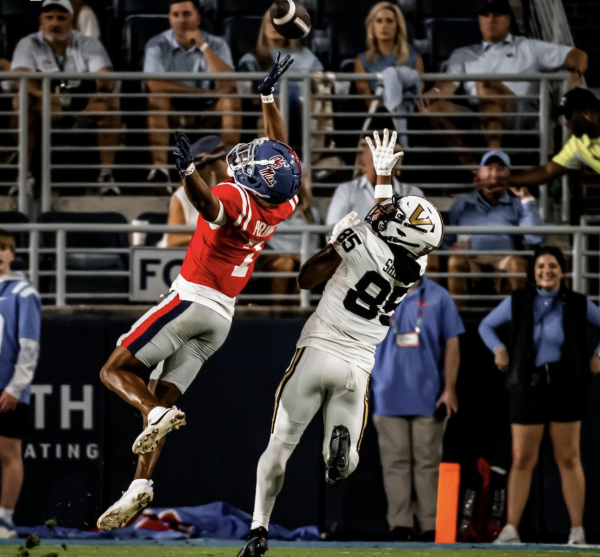
If Vanderbilt wants to fill the metaphorical candy bowl back up next season, it’ll need to go back to the drawing board.
Bit-O-Positives
It would be unlike myself — an unrelenting optimist when it comes to Vanderbilt Athletics — to not point out that there were a few positives from this game.
For starters, Taylor showed a few really exciting flashes for which he deserves credit, especially under the bright lights of Vaught-Hemingway. It isn’t easy for a quarterback to come into that type of hostile environment and have success in his first career game. His fade to Sherill toward the end of the fourth quarter was stunning, and he cashed in on it a few plays later with a 2-yard scamper into the end zone.
He was also extremely effective in rushing the ball, recording five runs of over 10 yards. He ran fast, but also strong, using all 235 pounds that come with his 6’7” frame to truck defenders and fall forward for extra yards. It was this rushing effort that helped open up some running lanes for the rest of the Commodores. In fact, Vanderbilt’s 169 rush yards marked the most the Commodores have had since their Week Two win over Alabama A&M, and the first time they had gone over 100 yards since Week Three against Wake Forest. Taylor utilized his legs well, and in doing so, paid a sort of homage to Wright, who did the same to make his teammates’ lives easier last season as well.
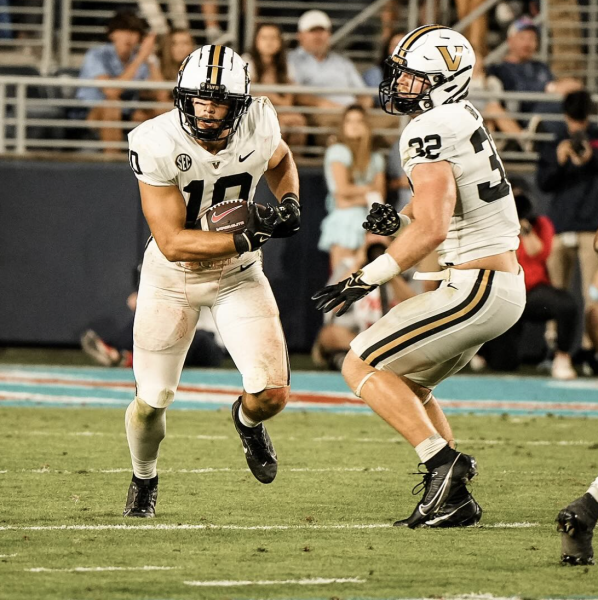
Still, the shining star for Vanderbilt was sophomore linebacker Langston Patterson. Patterson has been solid for Vanderbilt all season but — behind star linebacker CJ Taylor — hadn’t done much. Sure, he was averaging 4.7 tackles a game, a solid number for a defender who had played in just two games during his freshman season. The potential was there, as it felt like every week Patterson had been getting better and better. This week, that potential flashed. Patterson paced the team in tackles with nine, three of which went for a loss, while also recording a sack, forcing a fumble and nabbing an interception. He was all over the field, and he showed that he is more than capable of being a key contributor to this football team.
As the Commodores’ season gets another week closer to ending, they’ll prepare for what seems like their last chance to get back into the win column. With alumni returning for Homecoming Weekend, Vanderbilt will take on the Auburn Tigers (4-4, 1-4) at FirstBank Stadium on Saturday, Nov. 4.



